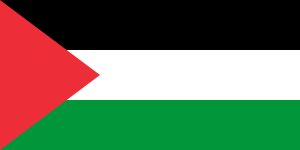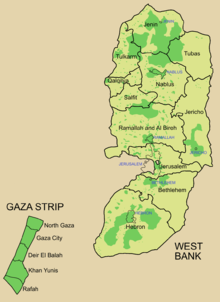Hamas wins Palestinian election
Thursday, January 26, 2006


This morning, Hamas leaders announced that they had an "outright majority" in the 132-seat Palestinian Legislative Council. "Hamas has won more than 70 seats in Gaza and the West Bank, which gives it more than 50 percent of the vote," said Ismail Haniyeh, a leader of Hamas.
In order for Hamas to have a majority, they needed at least 67 seats. Ismail Haniya, a senior Hamas leader, said they "expected to win at least 70 seats."
Just hours after the statement, and based on results that Hamas supplied from representatives at polling stations, Prime Minister, Ahmed Qurei of Fatah and his cabinet submitted their resignations. "This is the choice of the people. It should be respected. If it's true, then the president should ask Hamas to form a new government," said Qurei. "For me, personally, I sent my resignation."
Although Qurei submitted his resignation, the party has not officially conceded defeat, but do acknowledge the claim ahead of official results.
Fatah has been in control of the Palestinian government for decades now, and on Wednesday, exit polls released after the polls closed, had shown that the Fatah party had a narrow lead in the elections.
However preliminary results based on 95% of the votes cast give Hamas' Change and Reform Party 76 seats, leaving Fatah with 43 seats. The remaining 13 seats went to several minor parties and independents.
Turnout was generally high, over 70% in all regions except Jerusalem, where turnout was less than 50%. Palestine's Central Elections Commission has stated that Israeli authorities prevented electoral arrangements in Jerusalem from meeting "the required standards for free, fair and transparent elections".
Mushir al-Masri, who won the election said in regards to Israel, "negotiations with Israel are not on our agenda." He also stated, "recognizing Israel is not on the agenda either now."
Hamas also stated that it has no intentions of disarming and says, "Hamas does not plan to change even one word," in the groups charter, which calls for the destruction of the Israeli political system.
Mahmoud Abbas, the current President of the Palestinian Authority, was not affected by the election results but has said that he, "might resign if unable to pursue a peace policy." Abbas has been the President of the Palestinian Authority for only a year.
Abbas is also expected to ask Hamas to form the new government.
Clashes between Hamas and Fatah Supporters
editHamas supporters raised their flag and rushed the Parliament after the news that the group won the election.
As Fatah supporters tried to take down the green Hamas banners that were placed on the building, both groups threw rocks and broke windows in the Parliament building. Thousands of Hamas supporters cheered and whistled as the green banners were raised again. This is the first confrontation of the two groups since elections ended yesterday.
Results praised in Middle East, but US and EU are cautious
editHamas is labelled as a terrorist group by both the European Union and the United States State Department, and now will be the ruling faction of the Palestinian Authority, this creates difficulties for US and EU participation in efforts to resolve the Israeli-Palestinian conflict.
The Washington Post reported last week that the US secretly channelled US$2 million to Fatah in the final weeks of the campaign.
United States Secretary of State Condoleezza Rice repeated the US/EU call for Hamas to reject violence and recognize Israel, and reminded that the US still considers Hamas a terrorist group. Elmar Brok, a senior member of the EU Parliament, said that the EU may cut off aid to the Palestinians if Hamas institutionalizes terrorism once it takes control of the government.
British Prime Minister Tony Blair, speaking through a spokesman, stated that Britain "can only do business with people who renounce terrorism."
Italian Prime Minister Silvio Berlusconi was quoted as saying "It is a very, very, very bad result."
However, media and government outlets throughout the Middle East such as Iran and Lebanon, who consider Hamas to be in a defence struggle, praised the result of the elections. "The Palestinian people faithfully chose the option of resistance and are to fully support it," said Iran's Foreign Ministry Spokesman Hamid-Reza Asefi. And some governments such as Sweden and Japan praised the democratic system at work in Palestine. Sweden's Foreign Minister Laila Frievalds said that the elections were a "a protest against those in power who have not done enough, a reaction to the incapacity to lead the political process forward," though she stated Sweden's commitment to the EU's call for Hamas to end its violent ways if peace negotiations can continue.
Ayyoub Muhanna, 29, who owns a spare parts shop in Lebanon said; "This is a victory to all the region's free people; the Palestinians gave their vote to the party that gave of its blood."
Related news
edit- "Hamas takes victory in Gaza elections" — Wikinews, January 29, 2005
Sources
edit- "Hamas supporters raise flag at parliament building" — IrelandOn-Line, January 26, 2006
- "Hamas, Fatah supporters clash" — The Boston Globe, January 26, 2006
- Ali Waked. "Hamas wins; ministers resign" — Ynetnews, January 26, 2006
- Shmuel Rosner. "Bush urges Abbas to remain in office despite Hamas victory" — HAARETZ.com, January 26, 2006
- "Hamas wins upset victory in Palestinian election" — Reuters, January 26, 2006
- Glenn Kessler. "Poll result means hard choices for Bush" — The Sydney Morning Herald, January 26, 2006
- "Officials: Hamas wins Palestinian election" — China Daily, January 26, 2006
- Steven Erlanger & Greg Myre. "Hamas claims victory and upends Mideast politics" — International Herald and Tribune, January 26, 2006
- Marc Humbert. "Sen. Clinton: No Hamas recognition unless they renounce violence" — Newsday.com, January 26, 2006
- John Leicester. "Foreign Leaders Shocked at Hamas Win" — Associated Press, January 26,2006
- "Iran hails Hamas election victory" — Xinhua, January 27, 2006
- "Palestinian elections: MEPs hail success of democratic process but urge Hamas to take the path of peace" — European Parliament, January 26, 2006
- "Elections for the Palestinian Legislative Council show the level of democratic development of Palestinian society" — Council of Europe, January 26, 2006
- Council of European Union. "Presidency statement on behalf of The European Union on PLC elections" — www.diplomatie.gouv.fr, January 26, 2006
- Condoleezza Rice. "Statement on Palestinian Elections" — U.S. department of State, January 26, 2006
- George W. Bush and journalists. "Press Conference of the President" — whitehouse, January 26, 2006
- Matthew Kalman. "Landslide for Hamas -- limbo in Mideast: Leaders say Israel won't be recognized" — San Francisco Chronicle, January 27, 2006
- Central Elections Committee-Palestine. "The Second Legislative Elections: Results for the Electoral Lists: The Allocation of Seats" — Central Elections Committee-Palestine, January 26, 2006
- Central Elections Committee-Palestine. "Elections Under Occupation: Election Arrangements in East Jerusalem" — Central Elections Committee-Palestine, Undated
- Central Elections Committee-Palestine. "Final turnout map on elections day" — Central Elections Committee-Palestine, January 25, 2006
- World Socialist Web Site. "Hamas victory in Palestinian election" — World Socialist Web Site, January 27, 2006